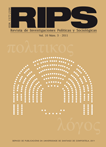Posverdad y democracia: una reflexión sobre los mecanismos de desinformación
Contenido principal del artículo
Resumen
La abundancia de información ha traído nuevos desafíos a nuestras sociedades digitales globales, de tal manera que se ha vuelto obligatorio hablar d eun “mundo de la posverdad” cuando analizamos los efectos de la tecnología y las redes sociales en nuestra vida cotidiana. La huella indelible de este tem se ha ido cimentando cada vez más notoriamente en nuestro espacio público: en 2016 la palabra del año fue posverdad (Hendricks y Vestergaard, 2019), y en 2017, fake news (Dalkir y Katz, 2020). En este artículo pretendemos sistematizar las principals líneas de reflexión sobre el tema de la desinformación y esclarecer los conceptos asociados a la misma, tratando así de resaltar los diferentes ejes que constituyen la complejidad del fenómeno.
Palabras clave:
Detalles del artículo
Referencias
ARENDT, H. (1995) A Verdade na Política, Lisboa: Relógio D’Água.
BALL, J. (2017) Post Truth: How Bullshit Conquered the World, London: Biteback Publishing Ltd.
BENKLER, Y.; FARIS, R.; & ROBERTS, H. (2018) Network Propaganda: Manipulation, Disinformation, and Radicalization in American Politics, New York: Oxford University Press.
BENNET, W. & LIVINGSTON, S. (2021) The Disinformation Age: Politics, Technology, and Disruptive Communication in the United States, Cambridge: Cambridge University Press.
BERNECKER, S.; FLOWERREE, A.; & GRUNDMANN, T. (2021) The Epistemology of Fake News, Oxford: Oxford University Press.
CASTELLS, M. (2015) The Networks of Outrage and Hope: Social Movements in the Internet Age, Chichester: Wiley.
CENTRE FOR DATA ETHICS AND INNOVATION (CDEI) (2019) Deepfakes and Audio-visual Disinformation. UK: Centre for Data Ethics and Innovation.
CHEYFITZ, E. (2017) The Disinformation Age: The Collapse of Liberal Democracy in the United States, New York: Routledge.
CROUCH, C. (2013) Post-démocratie, Bienna-Zurique: Diaphane.
COSENTINO, G. (2020) Social Media and the Post-Truth World Order: The Global Dynamics of Desinformation, Cham: Palgrave Macmillan.
DALKIR, K., & KATZ, R. (2020) Navigating Fake News, Alternative Facts and Misinformation in a Post-Truth World, Hershey: IGI Global.
ENTIDADE REGULADORA PARA A COMUNICAÇÃO (ERC) (2019) A Desinformação - Contexto Europeu e Nacional. Lisbon: ERC.
EUROPEAN COMMISSION (EC) (2018) EU Code of Practice on Disinformation. Strasbourg: European Commission.
FIGUEIRAS, R. (2017). A Mediatização da Política na Era das redes Sociais, Lisbon: Alêtheia Editores.
GERVEREAU, L. (2007). Ver, Compreender, Analisar as Imagens, Lisbon: Edições 70.
GIL, I. (2011). Literacia Visual: Estudos Sobre a Inquietude das Imagens, Lisbon: Edições 70.
HENDRICKS, V. & VESTERGAARD, M. (2019). Reality Lost: Markets of Manipulation, Misinformation and Manipulation, Switzerland: Springer Open.
HUYGHE, F.-B. (2021). Fake News: le Livre de Référence, Versailles: VA Éditions.
INNERARITY, D. (2016). A Política em Tempos de Indignação, Alfragide: Dom Quixote.
JANKE, R. & COOPER, B. (2017). News Literacy: Helping Studentes and Teachers Decode Fake News, Lanham: Rowman & Littlefield.
KOVACH, B. & ROSENSTIEL, T. (2004). Os Elementos do Jornalismo: o que os profissionais do jornalismo devem saber o público deve exigir, Lisbon: Porto Editora.
LEVESLEY, D. (2016). What I want to tell you about fake news after my job at Facebook. Available at: https://inews.co.uk/news/technology/facebook-trying-combat-fake-news-winding-back-time-biggest-decisions-year-37005
MANIN, B. (1997). The Principles of Representative Government, Cambridge: Cambridge University Press.
MCBRAYER, J. (2021). Beyond Fake News: Finding the Truth in World of Misinformation, New York: Routledge.
MEZARIS, V.; NIXON, L.; PAPADOPOULOS, S.; & TEYSSOU, D. (2019). Video Verification in The Fake News Era, Switzerland: Springer.
NOORTJE, M. (2017). Digital Sociology, Cambridge: Polity Press.
O'CONNOR, C. & WEATHERALL, J. (2019). The Misinformation Age: How False Beliefs Spread, New Haven: Yale University Press.
PARISER, E. (2011). The Filter Bubble: What Internet is Hiding from You, New York: The Penguin Press.
PERDEW, L. (2017). Information Literacy in the Digital Age, Minneapolis: Abdo Publishing.
SANTA PEREIRA, J. (2019) “O entretenimento e a celebrização como modalidades de comunicação política”, in B. CARRIÇO REIS & S. RIVERA MAGOS (coords.) Comunicação Política, Lisbon: NIP-C@M/EdiUAL, 75-103.
SCHROEDER, R. (2018) Social theory after the internet. London: UCL Press.
SUSMA-PEÑA, T.; DRUCKMAN, M.; & ODURO, N. (2020) Fighting Misinformation: Digital Media Literacy. Virginia: The Great Courses.
UNESCO (2018) Journalism, Fake News & DisInformation. Paris: United Nations Educational, Scientific and Cultural Organization.
VILMER, J.-B.; ESCORCIA, A.; GUILLAUME, M.; & HERRERA, J. (2018) Information Manipulation: a Challenge for Our Democracies. Paris: Policy Planning Staff (CAPS) of the Ministry for Europe and Foreign Affairs and the Institute for Strategic Research (IRSEM) of the Ministry for the Armed Forces.
VOLKOFF, V. (2000) Pequena História da Desinformação. Lisbon: Editorial notícias.
WITTGENSTEIN, L. (1986) Philosophical Investigations. Oxford: Basil Blackwell Ltd.






